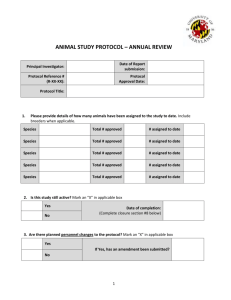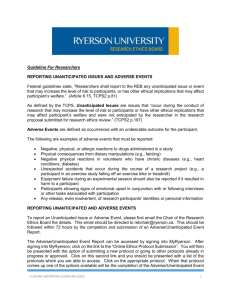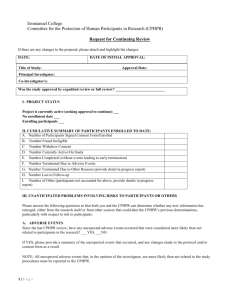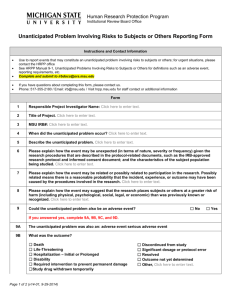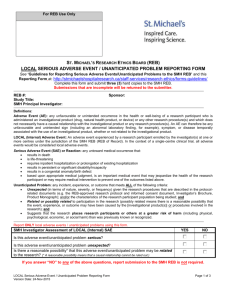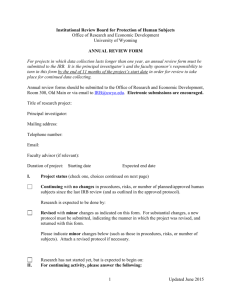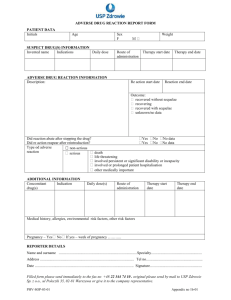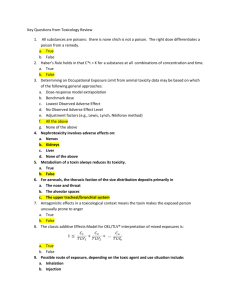guidance notes for reporting unanticipated problems to the reb
advertisement
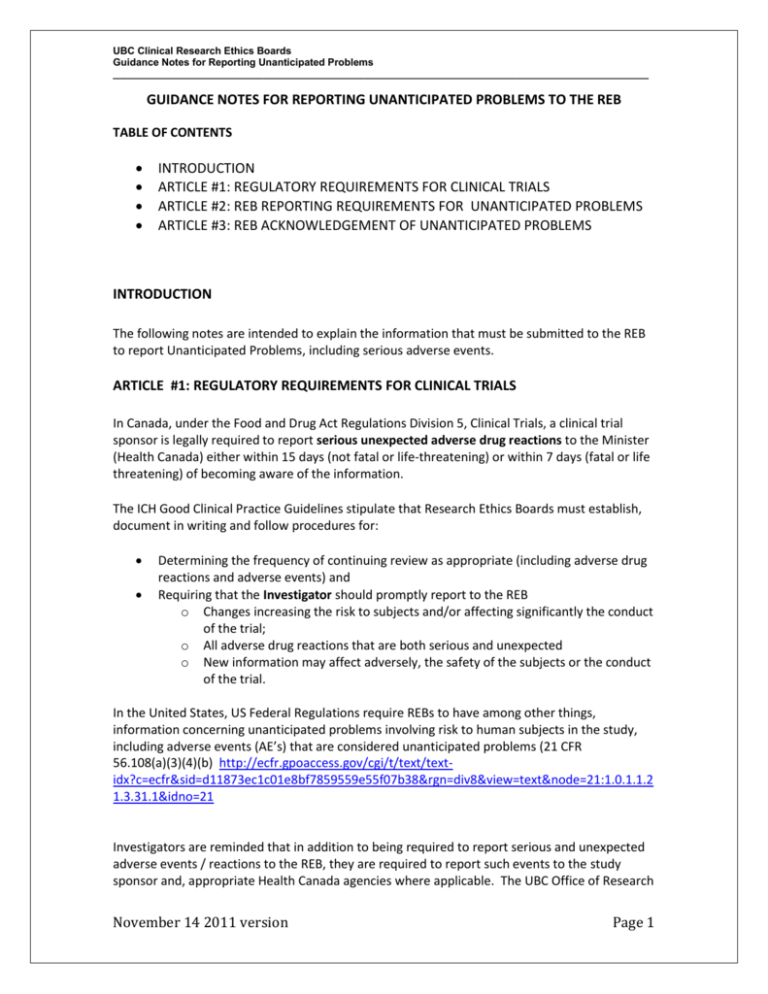
UBC Clinical Research Ethics Boards Guidance Notes for Reporting Unanticipated Problems ________________________________________________________________________________________________ GUIDANCE NOTES FOR REPORTING UNANTICIPATED PROBLEMS TO THE REB TABLE OF CONTENTS INTRODUCTION ARTICLE #1: REGULATORY REQUIREMENTS FOR CLINICAL TRIALS ARTICLE #2: REB REPORTING REQUIREMENTS FOR UNANTICIPATED PROBLEMS ARTICLE #3: REB ACKNOWLEDGEMENT OF UNANTICIPATED PROBLEMS INTRODUCTION The following notes are intended to explain the information that must be submitted to the REB to report Unanticipated Problems, including serious adverse events. ARTICLE #1: REGULATORY REQUIREMENTS FOR CLINICAL TRIALS In Canada, under the Food and Drug Act Regulations Division 5, Clinical Trials, a clinical trial sponsor is legally required to report serious unexpected adverse drug reactions to the Minister (Health Canada) either within 15 days (not fatal or life-threatening) or within 7 days (fatal or life threatening) of becoming aware of the information. The ICH Good Clinical Practice Guidelines stipulate that Research Ethics Boards must establish, document in writing and follow procedures for: Determining the frequency of continuing review as appropriate (including adverse drug reactions and adverse events) and Requiring that the Investigator should promptly report to the REB o Changes increasing the risk to subjects and/or affecting significantly the conduct of the trial; o All adverse drug reactions that are both serious and unexpected o New information may affect adversely, the safety of the subjects or the conduct of the trial. In the United States, US Federal Regulations require REBs to have among other things, information concerning unanticipated problems involving risk to human subjects in the study, including adverse events (AE’s) that are considered unanticipated problems (21 CFR 56.108(a)(3)(4)(b) http://ecfr.gpoaccess.gov/cgi/t/text/textidx?c=ecfr&sid=d11873ec1c01e8bf7859559e55f07b38&rgn=div8&view=text&node=21:1.0.1.1.2 1.3.31.1&idno=21 Investigators are reminded that in addition to being required to report serious and unexpected adverse events / reactions to the REB, they are required to report such events to the study sponsor and, appropriate Health Canada agencies where applicable. The UBC Office of Research November 14 2011 version Page 1 UBC Clinical Research Ethics Boards Guidance Notes for Reporting Unanticipated Problems ________________________________________________________________________________________________ Ethics will report all reportable unanticipated problems to the Office of Human Protections or the US Food & Drug Administration, if the unanticipated problem occurs in a study that is funded by or supported by the US Federal Government or that is subject to the U.S. Food & Drug Regulations. Investigators MUST indicate in the Request for Acknowledgement form that the unanticipated problem relates to a US funded or regulated study, including providing where applicable, the US IND or IDE number. 1.1. Definitions As soon as reasonably possible: The term “as soon as reasonably possible” means that the timing of reporting will vary in accordance with the severity/seriousness of the information being reported, including the nature of the research associated with the problem. Unless, however, the event is a routine safety letter, DSMB report, periodic safety update report, summary of changes to the Investigator’s brochure that are minor and/or routine in nature, all new information and unanticipated problems must be reported within seven days of the incident, occurrence, outcome event, or the Investigator’s receipt of the notice of the event or the new information. Adverse Event (AE): Any untoward medical occurrence in a research participant administered an investigational product and which does not necessarily have a causal relationship with this product. An AE can therefore be any unfavourable and unintended sign (including an abnormal laboratory finding, for example), symptom, or disease temporally associated with the use of an investigational product, whether or not related to the investigational product. Local (Internal) Adverse Event: Those adverse events experienced by research participants enrolled by the investigator(s) at one or more centres under the jurisdiction of the REB of Record. In the context of a single-centre clinical trial, all adverse events would be considered local adverse events. Non-Local (External) Adverse Event: From the perspective of the REB overseeing one of more centres engaged in a multi-centre clinical trial, external adverse events are those adverse events experienced by research participants enrolled by investigator(s) at other centres/institutions outside the REB’s jurisdiction. Adverse Drug Reaction (ADR): Any response to a drug, biologic, or natural health product which is noxious and unintended, which occurs at doses normally used or tested for the diagnosis, treatment or prevention of a disease or the modification of an organic function. A reaction, as opposed to an adverse event, is characterized by the fact that a causal relationship between the product and the occurrence is suspected (i.e. judged to be at least a reasonably possibility). Serious Adverse Event (SAE): Any untoward medical occurrence at any dose that: Results in death Is life-threatening Requires inpatient hospitalization or prolongation of existing hospitalization Results in persistent or significant disability/incapacity Results in a congenital anomaly/birth defect November 14 2011 version Page 2 UBC Clinical Research Ethics Boards Guidance Notes for Reporting Unanticipated Problems ________________________________________________________________________________________________ Based upon appropriate medical judgement, is an important medical event that may jeopardize the patient or may require medical intervention to prevent one of the outcomes listed above. Unexpected Adverse Drug Reaction (UADR): An adverse reaction, the nature or severity of which is not consistent with the applicable product information (e.g. the Investigator’s Brochure for an unapproved investigational product or package insert/summary of product characteristics for an approved product). Medical Device Serious Adverse Event (MDSAE): An adverse event associated with a medical device complaint meets the criteria of a medical device SAE when both of the following are fulfilled: The event involves contact with the medical device and The event results in death or serious deterioration in state of health. This includes: o Life-threatening illness or injury o Permanent impairment of a body function o Permanent damage to a body structure o A condition that requires medical or surgical intervention to prevent permanent impairment of a body function or permanent damage to a body structure. Unanticipated Problem: Any incident, experience, or outcome (including an SAE, MDSAE, or UADR) that meets all of the following criteria: Unexpected (in terms of nature, severity, or frequency) given (a) the research procedures that are described in the protocol-related documents, such as the REBapproved research protocol and informed consent document, or the Investigator Brochure; and (b) the characteristics of the research participant population being studied; and Related or possibly related to participation in the research (possibly related means there is a reasonable possibility that the incident, experience, or outcome may have been caused by the [investigational product(s)] or procedures involved in the research); and Suggests that the research places research participants or others at a greater risk of harm (including physical, psychological, economic, or social harm) than was previously known or recognized. New Information: Any new information that might adversely affect the safety or well-being of the study participants, the conduct of the trial, or the participant’s willingness to continue in a study. New information includes, but is not limited to any relevant recent literature, interim findings, preliminary results of the study or of any other study (e.g. using the same drug). ARTICLE NUMBER #2: REB REPORTING REQUIREMENTS FOR UNANTICIPATED PROBLEMS, INCLUDING SERIOUS ADVERSE EVENTS LOCAL and NON-LOCAL 2.1. Local Serious Adverse Events: Only those local (internal) serious adverse events that meet the definition of an unanticipated problem (i.e. unexpected, related and involving greater risk – see definition above) are required to be reported to the REB. Local serious November 14 2011 version Page 3 UBC Clinical Research Ethics Boards Guidance Notes for Reporting Unanticipated Problems ________________________________________________________________________________________________ adverse events that meet the definition of an unanticipated problem should be reported to the REB promptly, but in any case no later than seven (7) days subsequent to the occurrence of the local event. Such events should be reported using the REQUEST FOR ACKNOWLEDGEMENT FORM, and should include: The status of the study and summary of participants enrolled A detailed description of the local event including an assessment as to whether the event reaction was mild, moderate or severe An opinion expressed by the local investigator that the event is both serious and unexpected and a justification of that opinion An opinion expressed by the local investigator that the event is related or potentially related to the study drug/procedure/device and an explanation of that opinion. An opinion expressed by the local investigator respecting the implications of the SAE on the continuation of the study and any further actions that may be required such as changes to the study procedure, informed consent or protocol. A statement of the study team response to the event and the patient outcome of the SAE The following local adverse events ordinarily should NOT be reported to the REB: Serious adverse events that are considered expected Serious adverse events that are considered not related to the investigational product or research procedures, whether the event is expected or not Non-serious adverse events, whether expected or not 2.2. Non-Local Serious Adverse Events: UBC’s REBs have adopted the CAREB Guidance dated July, 2010. http://carebaccer.org/files/CAREB%20Guidance%20%20Reporting%20Unanticipated%20Problems%20including%20AEs.pdf In accordance with the CAREB Guidance non-local (external) serious adverse events should be reported to the REB in the form of periodic safety update reports, accompanied by information that is meaningful and of use to the REB. The contents of the safety report(s) should ordinarily at a minimum, include a sponsor analysis of the significance of the adverse event or perhaps such an analysis from an independent Data Safety Monitoring Board (DSMB), with (where appropriate) a discussion of previous similar events and a position statement as to whether any changes are required. Investigators may rely on the sponsor’s assessment and provide to the REB a periodic safety update report prepared by the sponsor. The format used for annual safety reports is acceptable. UBC’s REBs expect that sponsors will be amending their reporting processes to provide for periodic safety update reports at least semi-annually. Periodic Safety Update Reports, should be reported to the REB as soon as reasonably possible, but in any case no later than fifteen (15) calendar days, after the Principal Investigator has received the report from the Sponsor. Such reports should be submitted using the Request for Acknowledgement Form. November 14 2011 version Page 4 UBC Clinical Research Ethics Boards Guidance Notes for Reporting Unanticipated Problems ________________________________________________________________________________________________ UBC’s REBs will ONLY accept individual case reports of non-local (external) SAE’s if they are unanticipated problems (see definition above). In the limited circumstances where an Individual Non-Local (external) SAE constitutes an unanticipated problem the report should be submitted to the REB as soon as reasonably possible, but in any event, no later than within seven (7) days after the Investigator has received the report from the sponsor. Such reports should be submitted using the Request for Acknowledgement Form. The report must include all of the following information: Justification of the assessment that the event described is both serious and unexpected Identification of all previous safety reports concerning similar adverse experiences Analysis of the significance of the current adverse experience in light of the previous reports, and Outline of any proposed protocol changes, informed consent form changes or other corrective actions to be taken by the sponsor in response to the unanticipated problem Reports not meeting these requirements will be returned to the submitter with a description of the REB reporting requirements as outlined above. 2.3. International Safety Reports: Submit International Safety Reports (i.e. CIOMS reports, Medwatch letters, Dear Investigator letters), using the Request for Acknowledgement procedure and form. 2.4 Updated Investigator Brochures: Updated Investigator Brochures and any addendums should be submitted as an amendment so that the current version will be readily accessible in the document section of RISe application along with the current approved protocol and consent. 2.5. Summary Reports: Summary Reports, including periodic line listings submitted in accordance with the provisions of the European Union directive or the FDA Guidance on Adverse Event Reporting to IRB’s, should be submitted using the Request for Acknowledgement form and procedure. 2.6. Data Safety Monitoring Board Reports: Data Safety Monitoring Board reports should be submitted as soon as possible following receipt by the Principal Investigator, using the Request for Acknowledgement form and procedure. ARTICLE #3 REB ACKNOWLEDGEMENT OF UNANTICIPATED PROBLEMS INCLUDING SAE’s 3.1. There is no Canadian regulatory requirement for REB acknowledgement to investigator’s of the submission of Unanticipated problems including serious and unexpected events, however, an acknowledgment certificate will be issued within the RISe on-line system. November 14 2011 version Page 5
